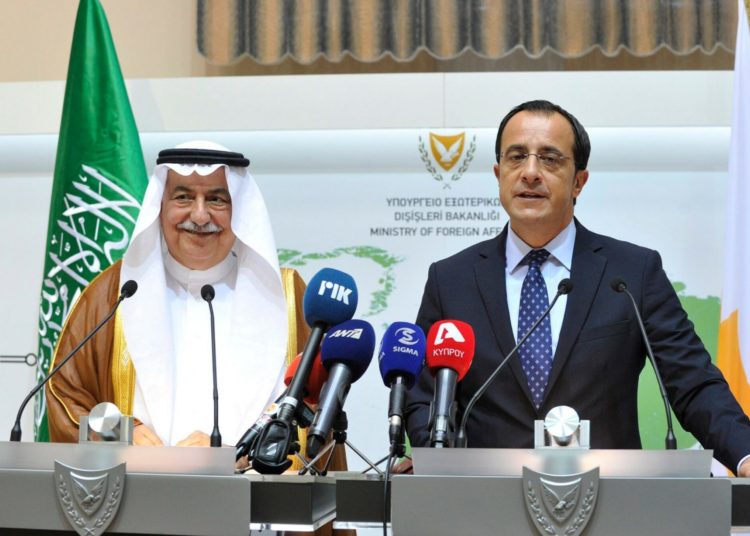Nordic Monitor
The historic visit of Saudi Arabian Foreign Minister Ibrahim bin Abdulaziz Al–Assaf to Cyprus has revealed how the Kingdom of Saudi Arabia has expanded its regional containment policy towards Turkey to the Mediterranean by enhancing bilateral relations with Cyprus.
Following the visit of the UAE foreign affairs and international cooperation minister to Cyprus in June, Al-Assaf paid an official visit to Cyprus on September 11, the first-ever in the history of diplomatic relations between the two countries.
The symbolic visit came one week after the official appointment of the first Saudi ambassador resident in Nicosia. Last week President Nicos Anastasiades, who was the first Cypriot president to have visited the kingdom in 2018, accepted the letter of credence of Ambassador Khaled Mohammed Al Sharif at his palace in Cyprus.
On Wednesday Al-Assaf and Cypriot Foreign Minister Nikos Christodoulides held a joint news conference after their talks. According to an official press release from the Cypriot foreign ministry, the Saudi diplomat, “taking into consideration the aggressive behavior of Turkey,” underlined Saudi Arabia’s solidarity and support for Cyprus during the official talks. Al-Assaf also declared Saudi support for Greek Cypriot efforts to reach a just, viable and comprehensive solution to the problem of ethnically divided Cyprus.
Furthermore, the foreign ministers exchanged views on EU-Saudi relations, the situation in the wider Middle East and Gulf region, and regional issues including energy and efforts to combat terrorism. During his program the Saudi foreign minister was received by President Anastasiades and Demetris Syllouris, president of the House of Representatives.
As a former finance minister from 1996 to 2016 and current member of Saudi Aramco’s board of directors, Al-Assaf’s visit indicated the Saudi interest in the Cyprus exclusive economic zone.
Unprecedented visits from the Gulf region and the establishment of a full-fledged Saudi diplomatic mission in Nicosia not only constitute an important milestone in changing regional balances but also exposed once again the “cold war” between Turkey and several Gulf countries led by Saudi Arabia.

Furthermore, enhanced diplomatic relations have given hints of specific problems that Turkey may have to face in the Middle East in the coming period. While the strengthened political and economic cooperation may provide the kingdom with significant advantages against Turkey in the Mediterranean, Cyprus could establish its diplomatic presence in some regional organizations such as the Organization of Islamic Cooperation (OIC) with the help of Saudi diplomatic influence.
Turkish ties with the Gulf monarchies have suffered because of President Recep Tayyip Erdoğan’s support for the Muslim Brotherhood and his government’s efforts to undermine the Saudi-led Gulf countries bloc. While he tried to position himself as the leader of all Muslims, Erdoğan’s “neo-Ottoman” aspirations to shape the Middle East and North Africa region have come to a halt, and Turkey today is isolated in the Middle East. Lebanon was also recently added to the list of Arab countries with which Turkey’s relations have deteriorated due to Erdoğan’s radical Islamist policies.
The diplomatic crisis between Lebanon and Turkey was sparked by a speech by Lebanese President Michel Aoun that was delivered on the centenary of the establishment of Greater Lebanon. “All attempts at liberation from the Ottoman yoke were met with violence, killings and the sowing of sectarian discord,” he said. The following day the Turkish foreign ministry condemned Aoun’s comments and said his speech implied “malicious and biased signs related to the Ottoman rule, along with accusations against the Ottoman Empire of practicing state terror in Lebanon.”
The murder of journalist Jamal Khashoggi in the Saudi Consulate General in Istanbul has put a spotlight on the deteriorating relations between Turkey and Saudi Arabia. Since the eruption of the Arab Spring, however, relations between the two countries have gradually, but systematically, deteriorated. During the Arab revolutions, Turkey supported the Muslim Brotherhood as a political movement in various Arab countries and armed and funded radical jihadist groups. However, the leadership of Saudi Arabia is opposed to the Muslim Brotherhood and sees it as a threat to their own domestic stability.
The critical watershed moment in Turkish-Saudi relations really came in June 2017, when Saudi Arabia, joined by Egypt, the UAE and Bahrain severed diplomatic ties with Qatar and took a number of punitive measures against the emirate, including imposing a total blockade. Saudi Arabia accused Qatar of supporting the Muslim Brotherhood along with several other militant Islamist groups in the region. Turkey then came to the aid of Qatar, transporting goods there that had been disrupted by the Saudi Arabia-imposed sanctions. Turkey also increased its military cooperation with Qatar by adding to the number of troops it maintains in that country.












